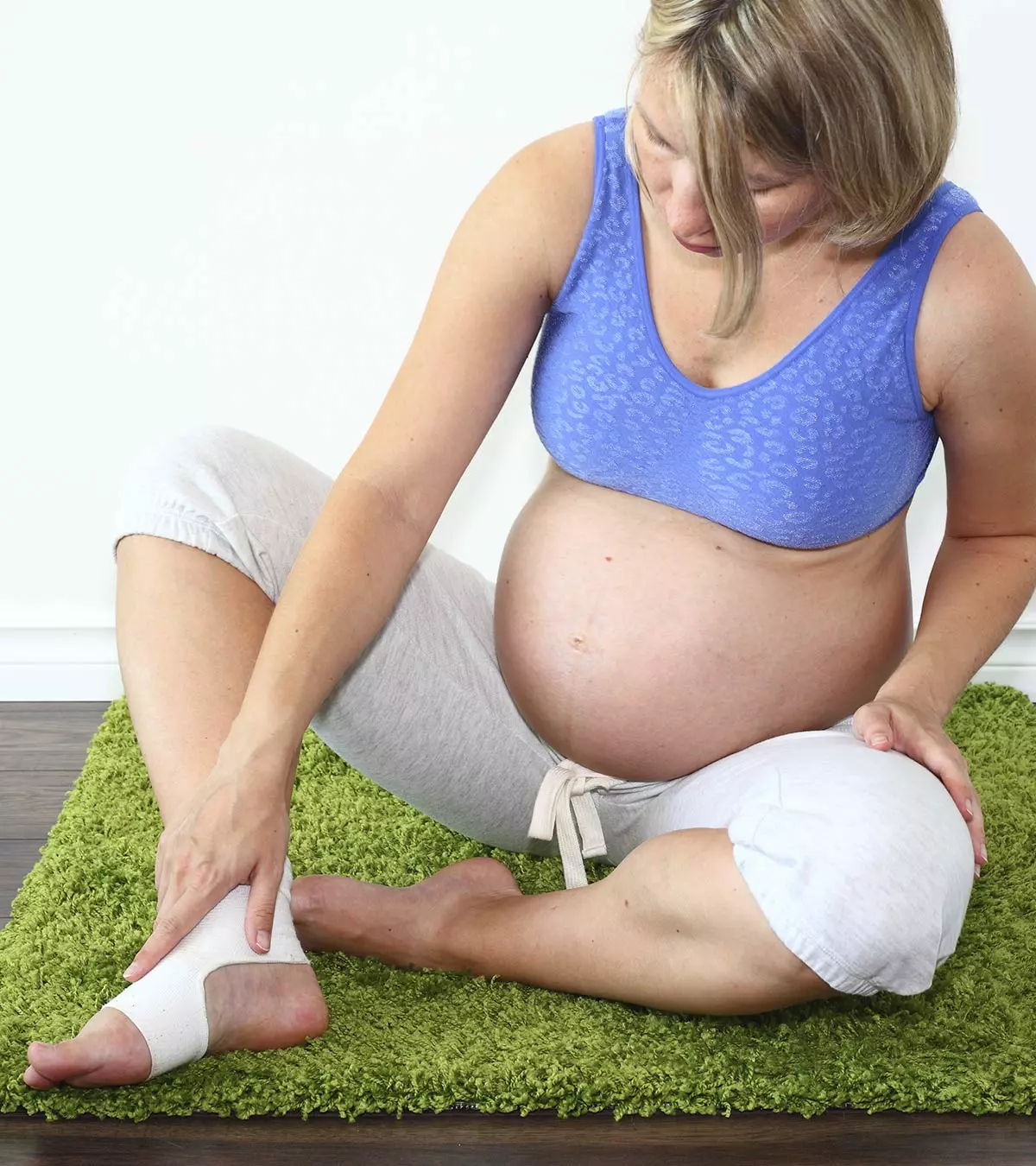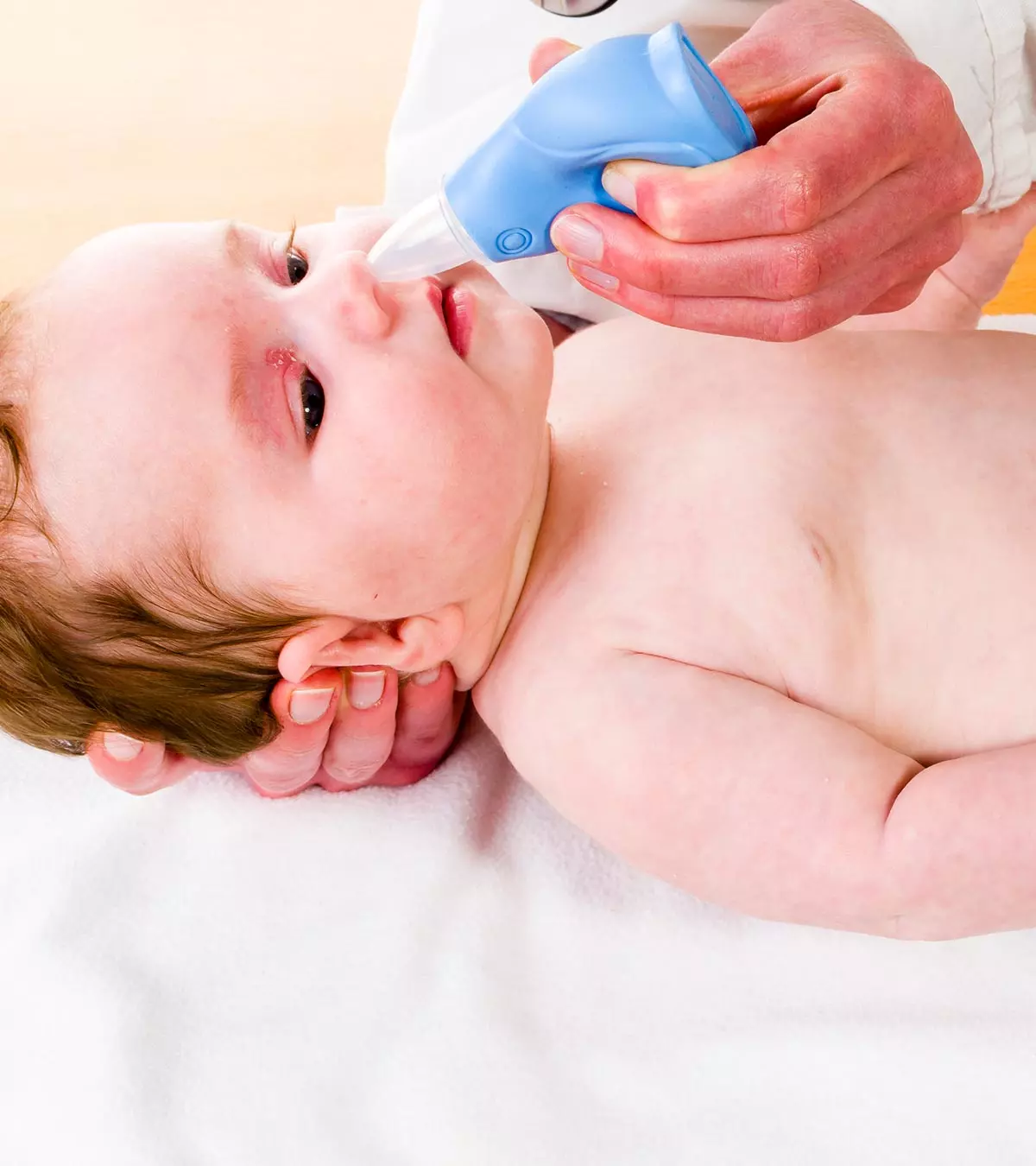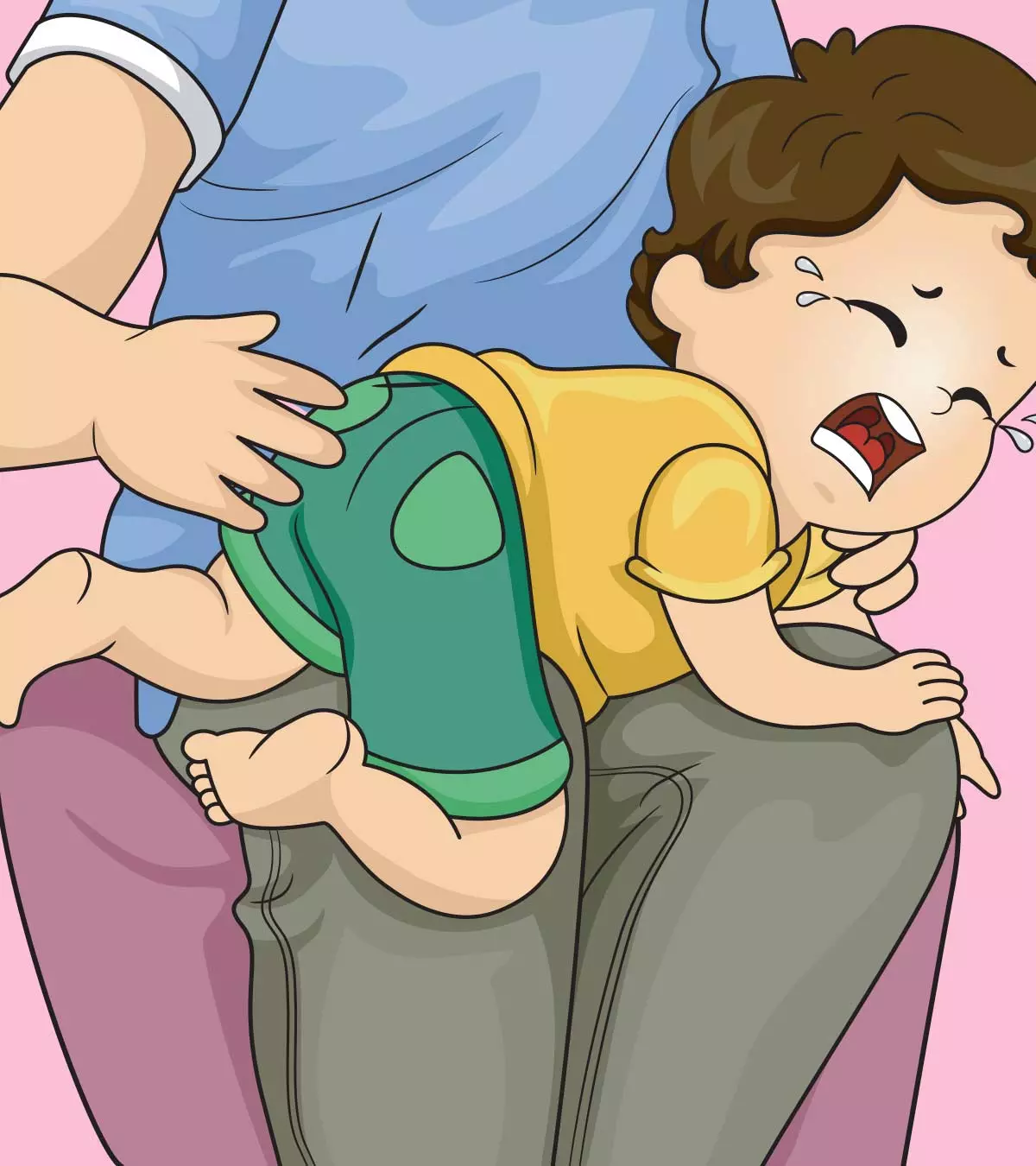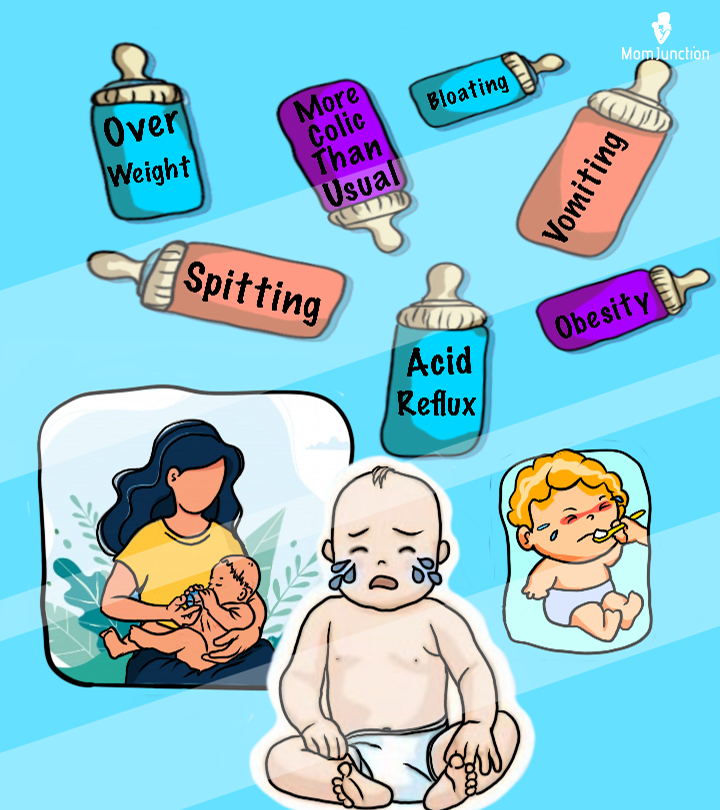
Image: Shutterstock
Your pregnancy journey is ending now that you are 9 months pregnant. Your water may break at any time now, and you may go into labor. You may be yearning to hold your baby in your arms, but now is also the time to be patient and stay calm. It’s also crucial to track the changes you’re going through this month.

Read on to know more about the 9th-month pregnancy symptoms and the physical and emotional changes you may undergo, the baby’s development, labor signs, diet to follow, foods to avoid, and other precautions to take. The post also offers some tips for dads-to-be.
Key Pointers
- Ninth-month pregnancy symptoms include weight gain, frequent urination, softening of vagina and cervix, backache, fatigue, and swelling of ankles and feet.
- Physical changes during the ninth month of pregnancy include a protruding belly, colostrum leakage, darker nipples and areola, stretch marks, fuller hair, and linea nigra.
- Emotional experiences during the ninth month of pregnancy include mood swings, stress, anxiety, absent-mindedness, and nesting instincts.
- To ensure a healthy pregnancy, maintain a balanced diet, stay hydrated, and avoid foods that can cause discomfort or complications.
What Symptoms Do You Experience In The Ninth Month Of Pregnancy?
The symptoms you experience now are the same as the ones you have been experiencing in the last couple of months (1) (2).
- Weight gain, ideally as per the BMI (3).
| Pregnancy month | BMI | BMI 25-30 | BMI > 30 |
|---|---|---|---|
| 9th | 9-11 kg | 6-8kg | 5-6kg |
- The uterus increases the pressure on the bladder, resulting in frequent urination.
- The expulsion of the cervixiA connecting canal between the uterus and the vagina from infections and bacteria during pregnancy” ] a few days before delivery indicates that labor is imminent. The cervix acts as a shield to the vagina and protects it from infections and bacteria.
- The walls of the vagina and the cervix soften, resulting in increased vaginal discharge to prevent any bacteria from reaching the uterus through the birthing canaliA passage formed by the cervix, vagina, and vulva through which the fetus passes during the birth process .
- The growing uterus adds to the strain of the lower back, causing a backache.
- The pressure that the growing uterus puts on the inferior vena cava (largest vein in the body) restricts backflow of the blood, which leads to pooling of blood in the veins. The result is varicose veins or swollen veins.
- The extra work that the body does to fulfill the demands of the fetus leads to fatigue.
- The water retention in the body causes edema or swelling of the ankle and feet.

- The extra weight, vitamin deficiency, or being too active or inactive can cause leg cramps (4).
- The body pains and frequent urination deprive you of sleep, which can lead to insomniaiA disorder characterized by the inability to sleep or stay asleep for long .
- The extra weight of the baby puts pressure on the pelvis causing pelvic pain. The National Health Service (NHS) revealed that about one in every five women suffer from pregnancy-related pelvic girdle pain.
- The baby drops down into the pelvis and relieves the pressure from the diaphragmiA respiratory muscle that acts as a partition between the chest and the abdomen that makes breathing easier.
- Braxton Hicks contractions become more prominent as your body is at the final stage of preparations for childbirth.
 Quick fact
Quick factJasmine, a mother and blogger, reflects her challenges in getting a good night’s sleep during the ninth month of her pregnancy. She shares, “Well, considering it takes me forever to get comfortable enough to fall asleep even when the baby doesn’t have hiccups that I just have to wait out for an hour, my sleep is pretty severely compromised these days. I wish we had mandatory naps (i).”
These changes affect your physical and mental state. Keep reading to know more.
Physical Changes In The Ninth Month
Here are a few physical changes that you may notice during your 9th-month pregnancy:
- The pregnant belly or baby bump is more protruded, and you can feel the baby drop down by this time. Also, your belly button sticks out.
- Your breasts may leak a bit of colostrum, a yellow fluid that becomes the baby’s first food. Contact your gynecologist soon in such cases since breast milk discharge may indicate impending complications.
- The nipple and the areola become darker.
- The expanding uterus leads to tearing of the skin tissues, creating stretch marks.
- Due to the hormonal changes, your hair becomes beautiful and fuller.
- Linea nigra, the dark line that runs from the belly button and the pubic hairline, becomes darker due to skin pigmentation.
You will also experience emotional ups and downs due to the continuing hormonal changes.
Emotional Changes That You Experience This Month
Here are some emotional changes:
- Mood swings, stress and anxiety
- Absent-mindedness and forgetfulness

The baby is fully developed by now but continues to grow and change every day until delivery.
Baby Development In The Ninth Month Of Pregnancy
The ninth month of pregnancy is from weeks 33 to 36 (5). By this time, your baby grows from the size of pineapple to as big as the head of a romaine lettuce (6).
Baby weight (7): 4.2 – 5.8lb (1.918 – 2.622kg)
Baby’s CRL (crown-rump length): 17.2 – 18.7in (43.7 – 47.4cm)
Here is how your baby is developing this month (8), (9), (1), (10), (11), (12):
| Body parts | Development |
|---|---|
| Skin | Smooth and pink |
| Lungs | Almost fully developed |
| Eyes | Starts to open and close. They also begin blinking. |
| Lanugo | Completely gone |
| Genitals | In boys, the testes begin to move from the abdomen to scrotum. In girls, the labia begin to cover the clitoris. |
| Head | Covered with hair |
| Nails | Grow till fingertips |
| Muscles | Toned and the baby can turn and lift the head |
| Ears | Earlobes are soft with little cartilage |
This is a crucial time for your baby to attain the ideal position before delivery.
Baby’s Position And Movements In The Ninth Month
Position:
The baby remains in the head-down position with the head properly fit into the pelvis. It is the ideal position and makes the movement of the baby through the birthing canal easier. Even if the baby attains a breech presentation (bottom-down position) now, there is still a chance to attain the ideal position before delivery (13).
Movements: With the baby fully grown, there is little space for it to move inside the uterus. The movements are restricted, except for a few arm and leg movements. You may feel the baby’s kicks under your ribs as the baby is now in the head down position.
Follow a healthy diet as you did before, and do not miss taking the supplements.
Jasmine warmly recalls the increased activity of her baby. She expresses, “Lots and lots of hiccups these days from Baby Bear. I also feel this weird twisting sometimes, plus the normal kicks and hand movements.”
 Quick fact
Quick factPregnancy Diet For The Ninth Month

According to Dr. Laila Kaikavoosi, a UK-based hormone specialist, “Pregnancy requires extra calories and nutrients to support your health and your baby’s development. Your diet must fulfill your specific calorie and nutrient needs, as proper nutrition is crucial for a healthy pregnancy and reducing potential complications.”
Here is the list of foods that you must add to your 9th month pregnancy diet (14):
- Eat a lot of green leafy vegetables, bread, milk, and fortified cereals that are a rich source of calcium. It is necessary for strong bones and teeth in your baby. A pregnant woman should take 1000mg of calcium/day as per the ACOG.
- ACOG recommends 600mcg of folic acid a day during pregnancy. It is necessary for preventing birth defects of the brain and spine in the baby. Leafy vegetables (spinach, broccoli, romaine lettuce, and kale), kidney beans, lentils, nuts, citrus fruits, and beans are a good source.
- Iron is necessary for the production of red blood and can be obtained from whole grain products, green leafy vegetables, dried fruit, beans, lean pork and beef, and sardines. The recommended intake including the supplements is 27mg/day.
- The recommended daily intake of vitamin A is 770mcg per day. It promotes bone strength and healthy eyesight. Orange or yellow vegetables (such as sweet potatoes or carrots), leafy vegetables, liver, and milk supply the required amounts.
- Vitamin D promotes healthy eyesight and strengthens the bones and teeth. The recommended intake is 600IU per day. Salmon and vitamin D fortified milk are good sources of this vitamin.
- Protein can be obtained from lean meat and poultry, eggs, seafood, peas, soy products, beans, milk, and unsalted seeds and nuts. It is necessary for the muscles and brain.
- Vitamin C is essential for healthy gums, teeth, and bones. Citrus fruits, strawberries, tomatoes, and broccoli are a good source of vitamin C. The average daily recommended intake is 85mg.
When it comes to pregnancy diet, ensure that you do not fumble on foods that can make you uneasy.
Foods To Avoid During The Ninth Month Of Pregnancy
Here is the list of foods you need to avoid:
- Avoid too much caffeine (anything more than 200-300mg/day) (15).
- Avoid raw or uncooked food as it can cause listeriosis, a foodborne disease caused by bacteria (16).
- Avoid eating swordfish, tilefish, king mackerel, and shark, as they contain a high level of mercury.
- Avoid having unpasteurized milk and cheese.
- Avoid consuming excess deep-fried and spicy food even if you have cravings, as these foods can aggravate heartburn.
- Avoid food containing gluten if you have celiac disease (17). Instead, you can opt for vegetables, fruits, potatoes, beans, poultry, and meat.
Next, we talk about the tests and procedures that the doctor may recommend during your ob/gyn visit.
What To Expect During Your Visit To The Ob/Gyn?
The doctor will carry out some examinations such as:
- Blood pressure check
- Weight check
- Measuring the fundal height
- Monitoring the fetal heartbeat and the position through an ultrasound
- Checking for the cervix ripening or dilation (18)
- The doctor will recommend the Group B streptococcus test. The vaginal or rectal swab will be tested to check for any infection. In the case of a positive test result, antibiotics will be prescribed. If the labor starts before the completion of the test, then antibiotics will be administered intravenously during the labor (19).
- Discuss with your healthcare provider regarding the delivery procedures, including the possibility of a cesarean section or a natural birth.
Since you are closer to the due date now and are expecting your baby’s arrival anytime soon, pay extra attention to any unusual symptoms during this month and contact the doctor in case of any discomfort.
What Do You Need To Know In Your Ninth Month Of Pregnancy?

If you experience any of the following symptoms, then call your doctor right away (20):
- Vaginal bleeding
- Water breaking
- Blurred vision
- Belly or pelvic pain
- Cramps in the lower belly
- Fever or chills
- Less or painful urination
- Nosebleed that doesn’t stop
- Dizziness
- Headaches that do not subside even after taking acetaminophen (Tylenol*)
- Constant leg cramps
- A sudden weight gain of 2 pounds in a week
The risk of preterm labor cannot be overlooked this month. Seek immediate medical help in the case of (21).
- Five or more contractions in an hour or one in every 10 minutes
- Menstrual-like cramps
- Vaginal fluid leak
- Vaginal bleeding (pink or bloody)
- Increased vaginal discharge
- Cramps in the abdomen, with or without diarrhea
- Pelvic pressure
- Ache in the lower back
Here is what to do when you experience the symptoms mentioned above:
- Lie to your left side or take a walk to check if the contractions get stronger. Also, drink plenty of water.
- Use a sanitary napkin in case of vaginal bleeding or water break.
- Keep emptying the bladder.
A healthy routine keeps you active and healthy during pregnancy.
Exercise During The Ninth Month Of Pregnancy
During the ninth month of pregnancy, exercises tailored for labor and delivery can be beneficial. The following recommended exercises aid in preparing your body for this phase and potentially facilitate a smoother delivery while aiding in postpartum weight recovery (22).
- Child’s Pose: This yoga posture elongates pelvic floor muscles, providing comfort and relaxation. Kneel, sit on your heels, and lean forward while extending your arms. As your belly grows, adjust by creating more space between your knees.
- Deep Squat: Widen your legs beyond hip width and squat slowly, hands together in front. Consult a physical therapist for guidance on frequency and repetitions.
- Quadruped Cat/Cow: On all fours, round your back while exhaling, then arch it gently while inhaling.
Exercise, when done correctly and under professional guidance, can greatly aid in preparing for labor and delivery. In addition to physical exercises, mental preparation techniques may help manage stress and anxiety.
Precautions To Be Taken In The Ninth Month
- Avoid standing for a long time.
- Avoid sitting and standing up suddenly as it can lead to a drop in your blood pressure, causing dizziness (23).
- Count the number of times the baby kicks. If you do not feel the kicks as often as you do, then eat something sweet because sugar rush makes the baby move (24).
- Keep stress at bay.
- Avoid smoking, and drinking alcohol.
- Drink plenty of fluids to stay hydrated.
- Give enough rest to your body.
- Take a warm bath to relieve the back pain and leg cramps.
- Do not lie on your back.
- Maintain oral hygiene.
- Have a smaller meal at regular intervals.
- Do not lift heavy objects.
- Try walking and Kegel exercises to strengthen the pelvic muscles and to boost your energy levels.
- Avoid taking any medicine without the doctors’ advice.
- Wear comfortable, flat footwear and loose, breathable clothes.
- Avoid cleaning cat litter as it can cause toxoplasmosis.
Your partner is the best person to stay beside you during this crucial time. Keep reading to find out how he can help.
Tips For The Dad-To-Be
- Help with the household chores.
- Help pack the maternity bag. Include items such as nursing bras, toiletries, comfortable clothing, baby clothes, and important documents.
- Accompany her to the prenatal appointments.
- Take her out and spend some quality time discussing your plans for the baby.
- Join her during the workout sessions.

- Keep all the necessary documents ready for the hospital visit and delivery.
- Search for a good pediatrician nearby.
Frequently Asked Questions
1. Is pregnancy a full nine months?
No, since it may not always be possible to track down the exact date you conceived, a general calculation is used by gynecologists (25). The pregnancy period is calculated from the first day of your last menstrual cycle when you are not pregnant yet. Hence, the extra weeks combined make a total of ten months of pregnancy (26).
2. What are some signs that labor is nearing?
Signs that you may start your labor are (27):
- Vaginal discharge in the form of clear, bloody, or pink color increases
- Your nesting instincts kick in, and you start to prepare for your baby, such as organizing and preparing the clothes
- Your cervix is dilated about ten centimeters
- Your baby drops into your pelvis
3. What are some tips for managing the discomforts of the third trimester?
To help manage third-trimester discomforts such as heartburn, one can consult their doctor about possible diet and lifestyle changes. Similarly, if you are having difficulty sleeping, you can use a body pillow to support your entire body instead of just a part of it (28). Get enough rest, stay hydrated, and eat nutritious food for overall well-being.
4. What are the different types of childbirth options available during the ninth month of pregnancy?
The various types of childbirth options available include vaginal delivery, assisted vaginal delivery, C- section, and vaginal birth after cesarean (VBAC) (29).
5. How can I manage stress during the ninth month of pregnancy?
It is important to prioritize rest, stay active during the day, share feelings with family and friends, let out your feelings, and take deep breaths frequently while pregnant. These tips and tricks can help manage stress while pregnant (30).
6. What should I pack in my hospital bag when I’m nine months pregnant?
Nursing bras, nursing pillows, socks, slippers, normal pillows, breast pads, extra washcloths, toiletries, books and magazines, nightgowns, and robes are essential things you should pack in your hospital bag (31).
7. What is the difference between a Braxton Hicks contraction and a true labor contraction at nine months pregnant?
The basic difference between Braxton Hicks contraction and true labor contractions is that the former lasts 30 seconds to two minutes, whereas the latter lasts 30 to less than 90 seconds and becomes longer over time. In addition, Braxton Hicks contractions are weak and become weaker over time, as opposed to true labor contractions, which get stronger over time (32).
8. Is it safe to have sex during the ninth month of pregnancy?
Couples can engage in sexual activities in the ninth month of pregnancy until the induction of labor unless advised otherwise by the doctor (33).
9. What are the benefits of breastfeeding for both mother and baby after giving birth?
Breastfeeding is beneficial for both the mother and the baby as it protects the baby from various illnesses and infections by sharing antibodies with the mother and reduces the risks of breast and ovarian cancer, high blood pressure, and type 2 diabetes for the mother (34).
Now that you are at the end of your gestation period, you may notice physical changes such as a protruded belly button, leaking breasts, and stretch marks. When you are 9 months pregnant, you may also experience mood swings and anxiety due to hormonal changes. These changes are normal and shouldn’t cause you to stress out. Instead, focus on maintaining a nutritious diet rich in minerals such as calcium, iron, and folic acid. Further, avoid excessive caffeine and standing for long periods. You can have a healthy and safe delivery by taking the necessary precautions.
Infographic: Pregnancy Diet For The Ninth Month
In the ninth month of pregnancy, it is crucial for a woman to eat a balanced diet that includes a variety of fruits, vegetables, whole grains, and proteins. In the following infographic, you can find a list of food items that should be included in your ninth-month pregnancy diet. Save the infographic and add the items to your next grocery list to ensure you get all the necessary nutrients for a healthy pregnancy.
Some thing wrong with infographic shortcode. please verify shortcode syntax
Illustration: 9 Months Pregnant: Symptoms Baby Development And Diet Tips
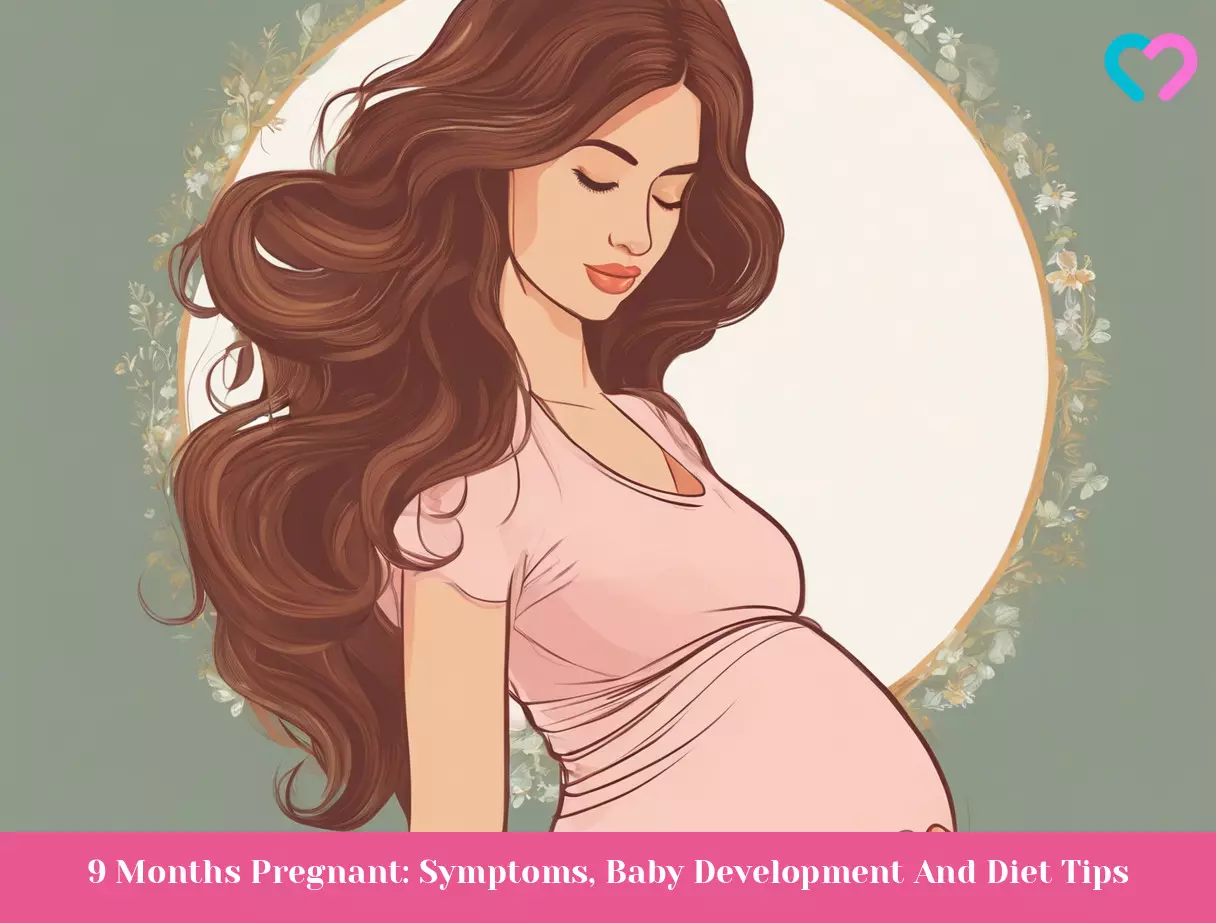
Image: Stable Diffusion/MomJunction Design Team
Personal Experience: Source
MomJunction articles include first-hand experiences to provide you with better insights through real-life narratives. Here are the sources of personal accounts referenced in this article.
i. Nine months pregnant.https://itsgettingridiculous.wordpress.com/2014/02/16/nine-months-pregnant/
References
1. What happens in the ninth month of pregnancy?, Planned Parenthood Federation of America Inc (2019)
2. Stages of pregnancy, Office on Women’s Health (2018)
3. Fact Sheet Gestational weight gain, NSW
4. Leg cramps during pregnancy, Healthdirect
5. Pregnancy – week by week, Betterhealth
6. Week by Week Fetus Size Demonstrated by Fruits, EPAOA
7. Fetal Development, UNSW Embryology (2018)
8. Third Trimester Fetal Development, Sutter Health (2025)
9. Stages Of Pregnancy, Cleveland Clinic (2019)
10. Embryonic Fetal Development, S.C. Department of Health and Environmental Control
11. Month 9 and Birth; Charlotte Lozier Institute
12. Fetal Growth And Development, South Dakota Department of Health
13. Breech birth, NIH
14. Nutrition During Pregnancy, ACOG
15. Pregnancy Precautions: FAQs, The Nemours Foundation (1995-2019)
16. Listeria Infection (Listeriosis), Organization of Teratology Information Specialists
17. How Celiac Disease Affects Pregnancy, Celiac Disease Foundation (1998-2018)
18. Pregnancy Month by Month, Hunterdon Healthcare (2018)
19. Pregnancy: Third Trimester (28 weeks to delivery), AACC
20. When to call us, Kaiser Foundation Health Plan, Inc (2018)
21. Premature Labor, Sutter Health (2025)
22. 5 exercises and techniques to train for childbirth; UT Southwestern Medical Center
23. Low Blood Pressure – When Blood Pressure Is Too Low, American Heart Association, Inc (2019)
24. Fetal Movement Counting, Stanford Children’s Health (2019)
25. Pregnancy Week 1 – 2; American Pregnancy Association
26. How long does pregnancy last?; ACOG
27. CONTRACTION AND SIGNS OF LABOR; March of Dimes
28.Your third trimester guide; Unicef
29.Pregnancy: Types of Delivery; Cleveland Clinic
30.How to Reduce Stress During Pregnancy; Penn Medicine
31.Hospital Bag Packing List; American Pregnancy Association
32.Deborah A. Raines and Danielle B. Cooper; Braxton Hicks Contractions; National Library of Medicine (2025)
33.Sex in trimester one, two and three of pregnancy; NCT
34.Breastfeeding Benefits Both Baby and Mom; CDC
35.The Third Trimester;The Johns Hopkins Hospital
Community Experiences
Join the conversation and become a part of our nurturing community! Share your stories, experiences, and insights to connect with fellow parents.
Read full bio of Dr. Annal Vaidya
- Dr. Laila Kaikavoosi graduated from King's College London Medical School in 1999. She completed her General Practice training in London and gained membership in the Royal College of General Practitioners in 2007. Dr. Kaikavoosi is a Diplomat of the Faculty of Reproductive and Sexual Health. She practiced and trained in teaching hospitals in the UK and USA.
 Dr. Laila Kaikavoosi graduated from King's College London Medical School in 1999. She completed her General Practice training in London and gained membership in the Royal College of General Practitioners in 2007. Dr. Kaikavoosi is a Diplomat of the Faculty of Reproductive and Sexual Health. She practiced and trained in teaching hospitals in the UK and USA.
Dr. Laila Kaikavoosi graduated from King's College London Medical School in 1999. She completed her General Practice training in London and gained membership in the Royal College of General Practitioners in 2007. Dr. Kaikavoosi is a Diplomat of the Faculty of Reproductive and Sexual Health. She practiced and trained in teaching hospitals in the UK and USA.
Read full bio of Sakshi Mishra
Read full bio of Rebecca Malachi
Read full bio of Aneesha Amonz








